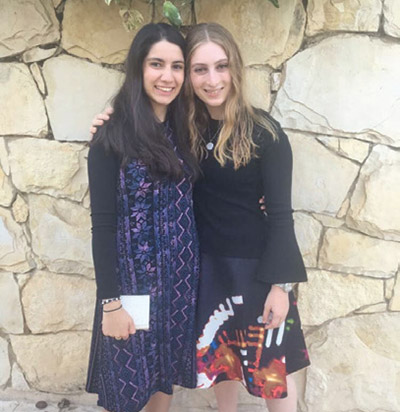
Rachel Retter is studying at Michlalah Yerushalayim in the Bayit Vegan neighborhood of Jerusalem. She grew up in Bergenfield, attended RYNJ for elementary school and Manhattan High School for Girls for high school. She’s attended Camp Dina, Camp Kaylie and NCSY Michlelet in the summers. Her family davens at Beit Midrash of Bergenfield (BMOB). She was also a much valued Jewish Link summer intern.
Her next stop? Stern College for Women.
Why did you choose to study at Michlalah?
I really like that Michlalah’s not a very homogenous place. There are many types of girls here, but what they have in common is that they are excited about learning.
Another reason is the classes themselves, and the way the schedule works. Michlalah has an unbelievable variety of classes, and almost total flexibility in how you make your schedule. Each time slot has on average two to four options, and aside from certain requirements, most of our schedule consists of whichever classes we want, during whichever time slots we want. Until Sukkot, we could try out classes and figure out which ones we liked, and then meet with various staff members to help us put it all together. Because of this system, I have a schedule full of classes I love, and break times that work really well for me.
And of course, a beautiful campus with a pool doesn’t hurt.
What kind of goals do you have for the year?
One goal was to learn new topics and sefarim I had never learned before, as well as re-learning topics I already knew but never fully understood in depth. Another was to become comfortable learning by myself and with a chavruta, for when I am no longer regularly taking Jewish classes. I also want to travel and spend Shabbat in many different places in Israel, including with families that only speak Hebrew.
What have been some of the highlights of your year so far?
One incredible moment happened on our Tzfat shabbaton. While walking to shul with a group of girls, my friend and I broke off from the crowd and entered a tiny shul at the end of a small street. We climbed up the narrow stairwell to the women’s section. It was Rosh Chodesh, and the men were screaming out words of Hallel, stomping and clapping so loudly that the whole building shook. When we got to the ezrat nashim, we saw that the women were dancing, too; not just swaying, but full-on dancing, eyes closed in deep concentration. I had never seen anything like it.
What kind of challenges have you faced coming to Israel?
The biggest difficulty, in my opinion, is mostly psychological: the knowledge of being away from home for so long. It can be very overwhelming when one first arrives and have the whole year ahead of them. But then time starts to pass, and before you know it, Sukkot is over and you’re wondering where the past few months went.
How has your year been different from your expectations?
Overall, my adjustment wasn’t too bad. I was very jetlagged the first week, which was difficult. But my Hebrew skills are pretty good, and the school helped us with a lot of things, such as navigating the transportation systems, changing money and figuring out different hechsherim.
Where is your favorite place to go for weekends/Shabbat so far?
I don’t have any immediate family or first cousins who live in Israel, so I have had the opportunity to get to know some of my more distant relatives. I spent Rosh Hashanah and the first days of Sukkot with my third cousins in Chashmonaim, and it was an amazing experience. They really made me feel like family, and I can’t wait to go back.
Who is a teacher at Michlalah whom you connect to especially well?
My rakezet, Mrs. Leah Falik, teaches Sefer Mishlei in a way that is extremely relatable and applicable. She gives examples from both our lives and hers to illustrate how to apply the concepts and advice we learn, and to help make them feel more real. She is also a great person to go to for advice, and she helped me a lot with making my schedule.
Which is one of your favorite classes at Michlalah?
One of my favorite classes is Beis Halevi. For the first half of the period, we take a familiar topic in Chumash, such as Eisav selling the bechora, or yetziat Mitzrayim, and, together with our chavrusa, learn numerous sources connected to them. These all build up to the Beis Halevi’s opinion, which always brings a new and brilliant perspective on these topics that I had thought I knew so well. Then, for the remaining time, the whole class discusses what we learned, what questions we still have, and how we might be able to answer them. I love the combination of independent work and collaborative thinking, as well as the fresh perspective I gain on material I learned when I was younger but never fully understood.
What are you most looking forward to for the rest of the year?
Honestly, what I’m most looking forward to is the normal, everyday routine here. Being in my classes, cooking dinner in my dirah with my friends, going away for Shabbos to both new and familiar places. Seminary is an amazing experience, and I feel so privileged to be here. For those of you coming to Israel next year, get excited!










